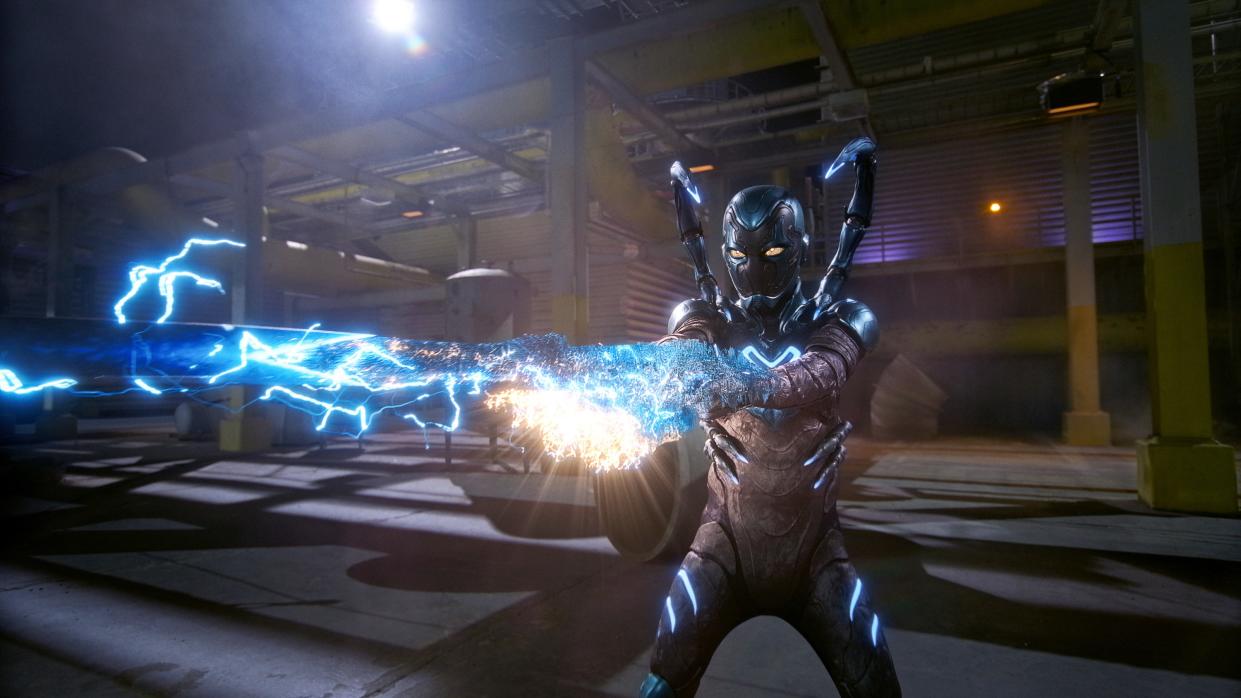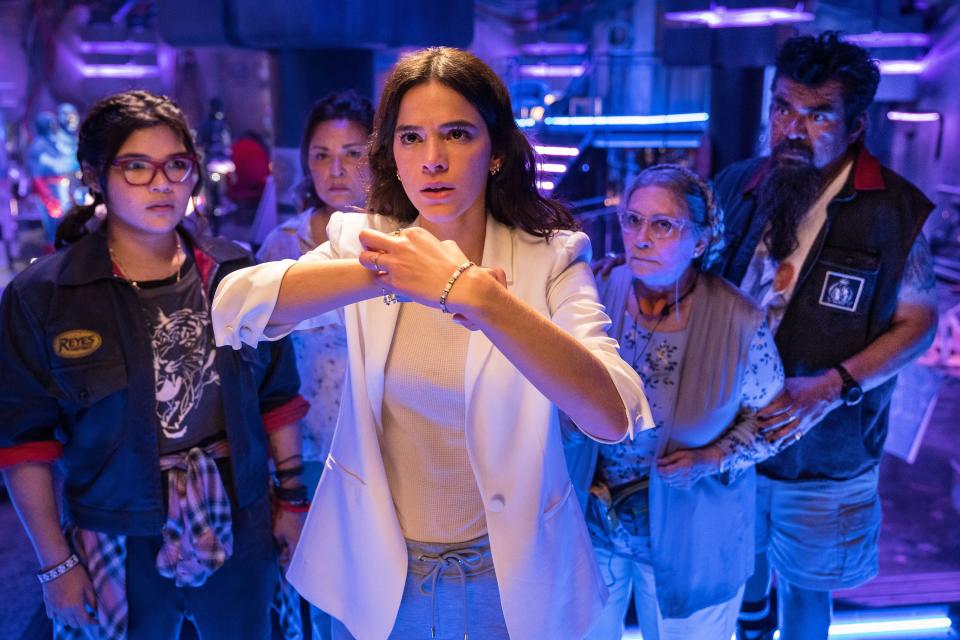‘Blue Beetle’ Review: At Least It’s Better than ‘Black Adam’?

A creatively orphaned movie about the power of family, Ángel Manuel Soto’s “Blue Beetle” is being released at a strange moment in time, both for superhero movies in general (already sputtering in the wake of “Avengers: Endgame,” and now saddled with a fresh stink of “this again?” in the weeks since “Barbenheimer” reminded Hollywood what real success feels like), and for the DCEU in particular (a damaged brand undergoing the kind of rebuild that you typically only find in salary-capped sports leagues).
On the one hand, the first Latino-led superhero outing from a major studio is a long-overdue lifeline to a woefully underrepresented community of loyal moviegoers (Latinos make up 19 percent of America’s population, but accounted for 29 percent of tickets sold in 2020), and “Blue Beetle” works hard to ensure that its culture isn’t just another dreadfully rendered CGI costume — the film has plenty of those, which makes it that much easier to tell the difference. On the other hand, this ultra-bland origin story is so feckless and familiar that it seldom feels like the first of anything so much as it does a half-hearted invitation to a party that’s already in the process of shutting down.
More from IndieWire
“Blue Beetle” is full of colorful flourishes and perfectly capable of delivering some decent fun whenever it focuses on its characters, but the film is so resigned to the safest cliches of its stale-ass genre that even the freshest things can’t always hold onto their flavor.
It’s rare to see a superhero movie that cares even less about its own mythology than I do, but I was truly baffled by the level of disinterest that Gareth Dunnet-Alcocer’s script — or whatever that remains of it — has in questions that some viewers might think important to answer. Questions like: What is the Blue Beetle? Why does the world-killing alien bioweapon, referred to as the Scarab, “choose” fresh-faced college graduate Jaime Reyes (Xolo Maridueña, all smiles and no sizzle) as its host? Does Susan Sarandon, whose performance as the flatly villainous weapons manufacturer Victoria Kord has all the pathos of a table-read, know that she is in this movie?
The lack of concern that “Blue Beetle” shows for these topics is absolutely deadening, even in a somewhat kid-friendly summer tentpole that clearly aspires to the energy of a Saturday morning from its opening shots. So far as that ambition is concerned, this movie is an unqualified success, as it starts with Sarandon hopping out of a military helicopter somewhere in the Arctic and asking her bionic henchman — Raoul Max Trujillo as the indestructible and flawlessly named Conrad Carapax — if they’ve found the mysterious thingy she’s been searching for all these years as the camera looks up at a giant egg of some kind and “Midsommar” composer Bobby Krlic plays a million different synths at the same time over the soundtrack.
That vibe carries over to the much warmer climate of Palmera City, a neon-flecked metropolis that feels like a mash-up between Miami and Hong Kong, which is a refreshing change of pace for a cinematic universe whose other fictional cities don’t have any personality whatsoever, borrowed or otherwise. Gentrification has come to town in a big way (a sign at the airport reads “Voted #1 tax rate for corporations in America!,” which is the kind of fun touch this film is able to get away with, even if an objective fact seems like a strange thing to vote on), but it still feels like home to Jaime, who returns to Palmera with the Reyes family’s very first college diploma in hand.
Played by veteran actor and sometime politician Damián Alcázar, who nails his role as the person whose very predictable death will spark the hero’s journey at the end of act one, Jaime’s dad is eager to protect his son from recent hardships, but his wise-cracking sister Milagro (Belissa Escobedo) is happy to lay it out in clear terms. “It used to be the other side of the tracks,” she says of their earthy neighborhood, which looks like a Starbucks-infested suburb of San Juan, “but now they want that too.”
But this isn’t the first time the Reyes family has had their backs against the wall, a history that has shaped Jaime’s relatives in different ways. His conspiracy theorist uncle Rudy — a loose and long-mulleted George Lopez as “the Mexican Doc Brown,” straining for laughs that he gets more often than not — has understandably grown convinced that the government is always listening for a reason to throw his loved ones in a cage, his paranoia anticipating a raid on the Reyes house that traffics in the kind of imagery that undocumented Americans know all too well. Meanwhile, Adriana Barraza’s performance as Jaime’s quietly bad-ass grandmother doesn’t reinvent its archetype, but the actress has a good time tapping into her character’s revolutionary past, which in this case involves mowing down Kord’s goons with a laser gun that looks like a giant Rubik’s Cube (Jaime’s mom is played by the great Elpidia Carrillo, but little else registers about the role).
The Reyes family is a fun group, and “Blue Beetle” is at its best whenever it lets them lead the way. Unsurprisingly, the film’s most (only?) original beat fits all of Jaime’s relatives in front of the camera, as his powers don’t manifest in secret as they do in virtually every other movie like this one, but rather at the kitchen table during the middle of a meal. Sure, it strains credulity that his parents aren’t a little more freaked out by the sight of a glowing space insect digging a hole into their son’s spine and encasing his entire body in an armored bodysuit that screams “what if the special effects for ‘Iron Man’ had been coded on a Playstation 2?” so loudly that it drowns out everyone else in the room (“Blue Beetle” was first conceived for streaming, and it shows), but I guess people might react differently to such things in a world where Zack Snyder’s “Batman v Superman” happened in real life, and not just in movie theaters. And then on Twitter. And then in the DMs of anyone who dared to write about it. And then on HBO Max. And then in hell, for all eternity.
You see, Jaime has recently crossed paths with the beautiful and altruistic Jenny Kord (Brazilian star Bruna Marquezine, given little to do in her first Hollywood role beyond acting tough and looking way too grown and sophisticated to believably fall for a kid like Jaime). Jenny is Victoria Kord’s “favorite” niece, and her meddling is what inadvertently thrusts the Reyes family into the fight for their lives. It’s a convenient set-up realized through a series of contrived encounters that practically dare you to suspend whatever disbelief you’ve got left, but there’s a nice symmetry to the fact that billionaire Jenny has everything but a family, which happens to be the only thing that Jaime has left. And so the photogenic twosome, whose mutual affection might be the least believable aspect of a movie that ends with a blue-vs-red battle scene so unconvincing that Soto should’ve just replaced it with some footage of his characters playing Rock ‘Em Sock ‘Em Robots, team up to stop Victoria from doing… you know… all the bad stuff she wants to do.
The specifics of her plan are best left unspoiled, if not re-written, but it’s safe to say that “Blue Beetle” doesn’t exactly earn the allusions it draws to America’s violent history of intervening in Latin American politics. Not that it earns any other kind of context, either. Victoria is a power-mad racist whose pathology is never clearly sub-divided between money and resentment — a character so thinly sketched that her Marvel equivalent, Jeff Bridges’ Obadiah Stane, seems like he was written by Robert Caro by comparison. At least Carapax gets a backstory, which is more than you can say for Jaime himself, an ever-grinning reminder that guilelessness isn’t enough to carry an 127-minute movie, even if the hero has a pair of robotic alien wings.

It’s also more than you can say about the Blue Beetle itself, whom this film makes the feeblest of attempts to turn into a Jarvis-like character called Khaji-Da (voiced by Becky G). If this thing is from another world, then why does it act and sound exactly like a piece of Earth tech? If it’s assimilating into Jaime’s mind, then why don’t we ever learn what it wants, or why it thinks Jaime can help get it? The answers to these questions are presumably well-known to anyone who’s read the “Blue Beetle” comics, but — like many other key mysteries surrounding the character’s past — the questions themselves are so poorly framed in this movie that it would’ve been better if they hadn’t been asked at all.
For a film that incessantly natters on about Jaime’s purpose, “Blue Beetle” has bafflingly little sense of what its own might be. “That progress is not meant for us,” Milagro laments as she looks out at the corporate businesses that are corrupting the soul of her family’s neighborhood, but it’s unclear what progress this movie hopes to claim for them instead. After all, what progress could possibly be found in a genre that has no concept of how to move forward?
Grade: C
Warner Bros. will release “Blue Beetle” in theaters on Friday, August 18.
Best of IndieWire
Sign up for Indiewire's Newsletter. For the latest news, follow us on Facebook, Twitter, and Instagram.

